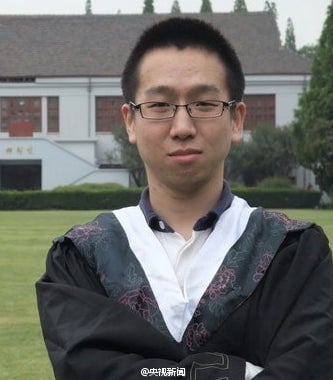Chinese bloggers are demanding answers to the mysterious poisoning of a Chinese student 19 years ago
When a 28-year-old university student in Shanghai died of poisoning last month, Chinese authorities probably didn’t expect a public outpouring of anger and emotion against the legal system. But the case has stirred up pent-up anger over a similar case that took place almost 20 years ago, and was never solved.

When a 28-year-old university student in Shanghai died of poisoning last month, Chinese authorities probably didn’t expect a public outpouring of anger and emotion against the legal system. But the case has stirred up pent-up anger over a similar case that took place almost 20 years ago, and was never solved.
In April, Huang Yang, a postgraduate medical student at Fudan University died after suffering weeks of vomiting and fever. Police later found chemicals in a water dispenser in his dorm and have since detained his roommate, who worked in a lab using some of those chemicals. The case, still unresolved, has been a top trending discussion topic on China’s massive microblogging platform Sina Weibo for weeks.

And rather than dying down, the discussion has recently changed direction. Remorse over the young student’s death has exploded into a heated discussion online in China about rule of law and cronyism in the country, as bloggers remember another university poisoning. For the past week, online Chinese forums have been filled with calls for the resolution of a 1994 poisoning by thallium of a young woman named Zhu Ling at Tsinghua University. Zhu recovered, but suffered permanent brain damage and her case was closed.
Today, on every post published by the official Weibo account of the Beijing Police, Chinese bloggers posted demands for Zhu’s case to be reopened. One blogger wrote (registration required), “You mutes, make information on Zhu Ling’s case public!” while others simply posted (registration required) Zhu Ling’s name over and over. A petition to the White House to investigate and deport her roommate, who some suspect as the culprit, has gotten over 100,000 signatures since it was started over the weekend. As one blogger asked (registration required), ”If we don’t stand up for Zhu Ling… who will stand up for me?” Discussion of Zhu reached such a pitch over the weekend that censors on Weibo have blocked searches for the terms “Zhu Ling” or “thallium.”

Why have a 19-year-old case and the death of one student in Shanghai elicited such strong reaction? “Part of the emotional reaction to the tragedies is anger that the justice system is thought to be incapable of doing its job properly,” says Liz Carter, an editor at the blog TeaLeafNation, which monitors Chinese media. China’s legal system is perceived to be deeply compromised by the influence of party officials; many bloggers believe that Zhu’s roommate, who was the only suspect in the case, got off free because of uncle and grandfather were powerful party officials.
Moreover, Zhu and Huang’s stories are only two of a number of grisly poisonings that have taken place at Chinese schools over the years—all while officials have done little more than call for “moral education” lessons and healthier attitudes towards competition. Last week, two girls, 5 and 6, died after eating yogurt poisoned by an employee of a rival primary school. And in 1997 and 2007, two students were poisoned by their classmates at Peking University and China University of Mining and Technology.